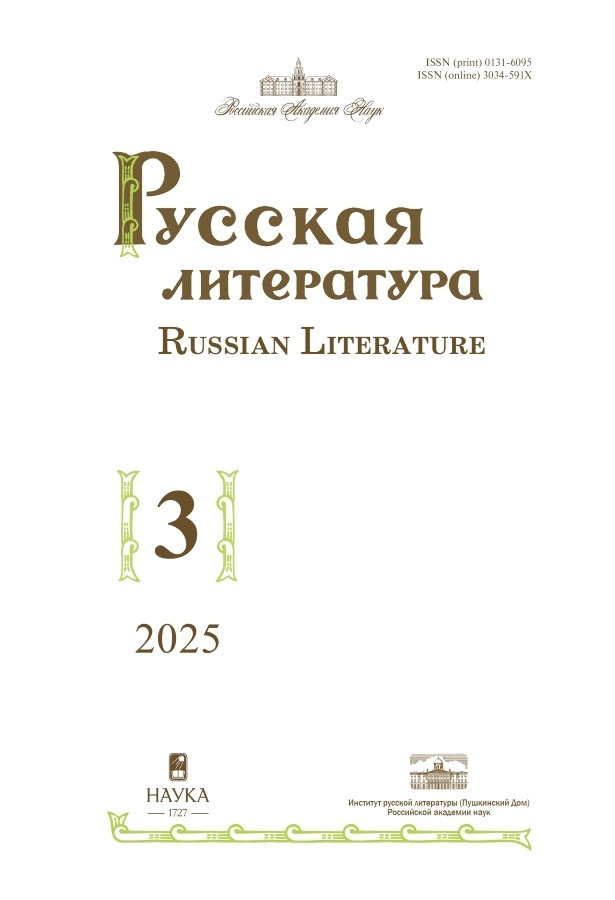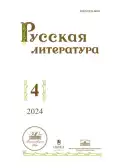Multimodal narration in the screenplays by V. V. Mayakovsky
- Authors: Ogudov S.A.1
-
Affiliations:
- Russian State University for the Humanities
- Issue: No 4 (2024)
- Pages: 201-214
- Section: Публикации и сообщения
- URL: https://gynecology.orscience.ru/0131-6095/article/view/672311
- DOI: https://doi.org/10.31860/0131-6095-2024-4-201-214
- ID: 672311
Cite item
Abstract
The article analyzes the screenplays by V. V. Mayakovsky as multimodal narratives that combine the models of feature films, documentaries and animation. Using the scripts for Farewell to the Fireplace, The Heart of Cinema, Benz No. 22 and others as the case studies, the interactions between the modes of transmitting a story line are revealed, highlighting Mayakovsky’s plan of the production as a complex synthesis of several cinematic strategies.
Keywords
Full Text
About the authors
Sergeĭ A. Ogudov
Russian State University for the Humanities
Author for correspondence.
Email: s.ogudov@gmail.com
ORCID iD: 0000-0002-5309-0754
Senior Researcher
Russian Federation, MoscowReferences
- Aisner L. Demonicheskii ekran. M., 2010.
- Belova L. I. Skvoz’ vremia. Ocherki istorii sovetskoi kinodramaturgii. M., 1978.
- Gibbons A. Multimodality, Cognition and Experimental Literature. London; New York: Routledge, 2012.
- Gurevich S. D. Sovetskie pisateli v kinematografe (20–30-e gody). L., 1975.
- Hake S. Weimar Film Theory // Weimar Thought: A Contested Legacy / Ed. by P. E. Gordon, J. P. McCormick. Princeton University Press, 2013.
- Hallet W. Reading Multimodal Fiction: A Methodological Approach // Anglistic. 2018. Vol. 29. Iss. 1.
- Herman D. Storytelling and the Sciences of Mind. Cambridge; London, 2013.
- Igelström A. Narration in Screenplay Text: A Thesis Submitted to the College of Arts and Humanities in Candidacy for the Degree of Doctor of Philosophy. Bangor University, 2014.
- Kibrik A. A. Russkii mul’tikanal’nyi diskurs. Chast’ 1. Postanovka problem // Psikhologicheskii zhurnal. 2018. T. 39. № 1.
- Ksenofontova A. The Modernist Screenplay: Experimental Writing for Silent Film. Palgrave Macmillan, 2020.
- Kuznetsova V. A. U kino byl drug: Kinodramaturgiia V. V. Maiakovskogo (rukopis’).
- Macdonald I. W. Screenwiting Poetics and the Screen Idea. Palgrave MacMillan, 2013.
- Maiakovskii V. V. Karaul! // Maiakovskii V. V. Poln. sobr. soch.: V 12 t. M., 1947. T. 11.
- Maras S. Screenwriting: History, Theory and Practice. London; New York, 2009.
- Nannicelli T. A Philosophy of the Screenplay. New York; London, 2016.
- Ogudov S. A. Kinopovestvovanie V. V. Maiakovskogo: soedinenie raznykh vidov kino v stsenarii «Kak pozhivaete?» // Slavisticheskii sbornik. 2019. № 95.
- Ogudov S. The Film Script as Oral Narrative of Personal Experience in Aleksandr Rzheshevskii’s Oeuvre // Studies in Russian and Soviet Cinema. 2022. Vol. 16. Iss. 3.
- Page R. Introduction // New Perspectives on Narrative and Multimodality / Ed. by R. Page. New York; London: Routledge, 2010.
- Palmer A. Fictional Mind. Linkoln; London, 2004.
- Price S. A History of Screenplay. Palgrave Macmillan, 2013.
- Price S. The Screenplay: Authorship, Theory and Criticism. Palgrave Macmillan, 2010.
- Pronin A. A. Bumazhnyi Vertov / Tselluloidnyi Maiakovskii. M., 2020.
- Shmid V. Otbor i konkretizatsiia v slovesnoi i kinematograficheskoi narratsii // Narratorium. 2011. № 1–2 (http://narratorium.rggu.ru/article.html?id=2017636; data obrashcheniia: 31.10.2024).
- Terekhina V. N. Ekspressionizm v russkoi literature pervoi treti XX veka: Genezis. Istoriko-kul’turnyi kontekst. Poetika. M., 2009.
- Vaisfel’d I. V. Masterstvo kinodramaturga. M., 1961.
- Zeman S. Oraliry, Visualization and the Historical Mind: The «Visual Present» in (Semi-)oral Epic Poems and Its Implications for a Theory of Cognitive Oral Poetics // Oral Poetics and Cognitive Science. Berlin; Boston, 2016.
Supplementary files













